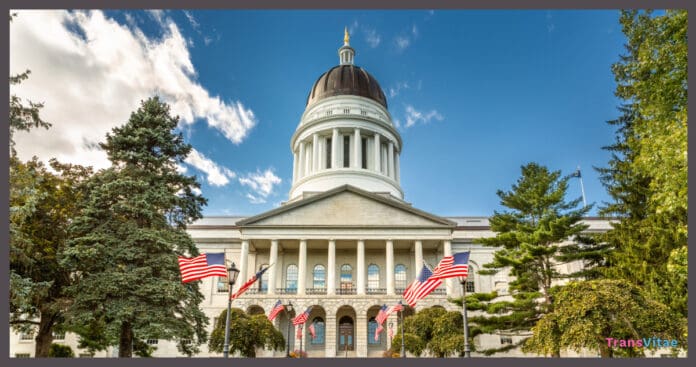In a bold move defending both civil rights and the well-being of vulnerable students, the state of Maine filed a federal lawsuit Monday against the U.S. Department of Agriculture, challenging a decision to freeze critical education funds in retaliation for the state’s refusal to bar transgender girls from participating in school sports.
The funding pause, announced last week by USDA Secretary Brooke Rollins, impacts programs that provide free and reduced-price meals to children across Maine’s public schools, childcare centers, and after-school programs. In total, over $5.7 million in federal nutrition aid—some already awarded and some pending—has been made inaccessible, according to the lawsuit.
At the heart of the conflict is President Donald Trump’s February 21 executive order banning transgender girls and women from playing on girls’ and women’s sports teams. During a White House event with state governors that day, Trump directly threatened to cut federal funding from Maine unless it complied. Maine Governor Janet Mills responded with a clear stance: “We’re going to follow the law, sir. We’ll see you in court.”
Now, that promise is becoming reality.
Maine Attorney General Aaron Frey filed the lawsuit in federal court in Bangor, calling the USDA’s actions “blatantly unlawful” and warning that the administration’s use of hunger-relief funds as political leverage sets a dangerous precedent.
“The president and his Cabinet do not make the law, and they are not above it,” Frey said in a statement Monday. “This action is necessary to remind the president that Maine will not be bullied into violating the rights of our citizens—especially the rights of transgender youth.”
At issue is the administration’s interpretation of Title IX, the federal civil rights law that prohibits sex-based discrimination in education. Last month, the U.S. Department of Education under Trump asserted that Maine’s policies allowing transgender girls to participate in school sports—and use facilities aligned with their gender identity—violated Title IX.
However, Maine’s legal protections present a distinct perspective.
In 2021, the Maine Legislature amended the state’s Human Rights Act to explicitly ban discrimination based on gender identity. Mills and Frey argue that this state law upholds federal civil rights—not violates them—and that denying transgender students equal participation in sports is discriminatory and unlawful.
Rollins, in her April 2 letter to Governor Mills, framed the freeze as a consequence of Maine’s “failure to protect women and girls” under Title IX, suggesting the state “cannot openly violate federal law… and expect federal funding to continue unabated.” She claimed the feeding programs were not impacted by the funding pause—a statement contradicted by state officials, who report that funds used to reimburse schools and providers for meals are already frozen.
The lawsuit seeks a temporary restraining order to immediately restore access to funds while the legal battle unfolds.
The situation deeply resonates with the transgender community. Advocates and families say targeting food programs as a way to force policy changes around transgender inclusion is not only cruel—it’s dehumanizing.
“These are children we’re talking about,” said Mara Greene, a transgender advocate in Portland. “Trans kids deserve to play sports, to belong, and to eat lunch like everyone else. Weaponizing hunger to punish inclusion is appalling.”
Governor Mills, in a statement after the lawsuit was filed, emphasized the broader implications.
“Maine may be the first state under this administration’s microscope,” she said. “But we won’t be the last. This isn’t just about our state—it’s about whether the rule of law, compassion, and dignity still matter in this country.”
As the legal showdown unfolds, transgender students, their families, and allies across the U.S. are watching closely. For many, Maine’s refusal to yield in the face of federal pressure sends a powerful message: that justice, inclusion, and the right to exist authentically are not up for negotiation.


